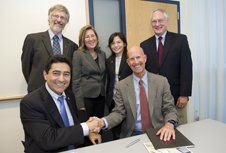Sep 22 2010
Northeastern University’s Center for High-rate Nanomanufacturing (CHN), a National Science Foundation-funded Nanoscale Science and Engineering Center, has signed an agreement with federal health researchers to advance research and guidance for occupational safety and health in nanotechnology, marking a significant step forward in the emerging field.
According to the agreement, CHN at Northeastern University with its core partner institutions—the University of Massachusetts Lowell, and the University of New Hampshire—will collaborate with the National Institute for Occupational Safety and Health (NIOSH) to advance workplace health and safety standards and practices, and act as a global resource for research, education and information dissemination in nanotechnology safety and health.
 CHN Director Ahmed Busnaina (bottom, left) joins NIOSH Director John Howard and other collaborators to sign the agreement. Photo by Mary Knox Merrill.
CHN Director Ahmed Busnaina (bottom, left) joins NIOSH Director John Howard and other collaborators to sign the agreement. Photo by Mary Knox Merrill.
The partners will pursue research on worker and consumer protection from exposures as well as on the toxicity of nanomaterials and their life cycle and environmental impacts.
“We’re very happy about this partnership,” said Ahmed Busnaina, CHN director and the William Lincoln Smith Professor of Mechanical and Industrial Engineering at Northeastern. “We need to make sure the process is safe and that we are protecting workers.”
He said the agreement will lead to new research collaborations among its industry partners, and also builds on the strong interdisciplinary research in nanomedicine already taking place at Northeastern.
NIOSH Director John Howard visited Northeastern on Sept. 20 to sign the agreement, which he said is extremely important to advancing nanotechnology safety research, given the field’s potential societal benefits.
The partnership advances Northeastern’s mission to develop innovative, use-inspired research that solves global challenges in areas such as health, security and sustainability.
CHN’s mission is four-fold: to bridge the gap between nanoscale science research and the creation of commercial products; to develop processes and tools that will enable high-rate/high-volume nanoscale manufacturing; to deliver educational information about nanomanufacturing to the workforce through partnerships among industry, universities and K-12 teachers and students; and to overcome barriers to commercialization.
The global market for nanotechnology is projected to be at least $1 trillion by 2015, according to the National Science Foundation.